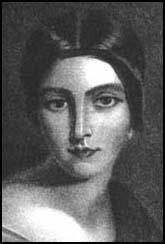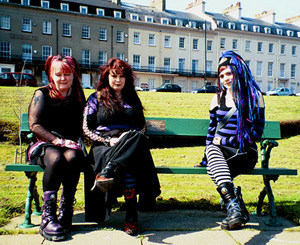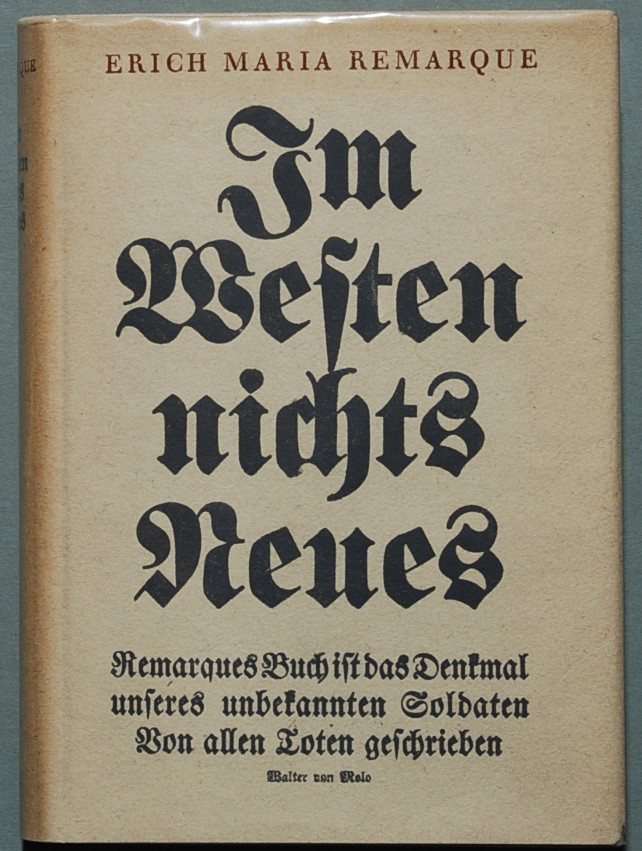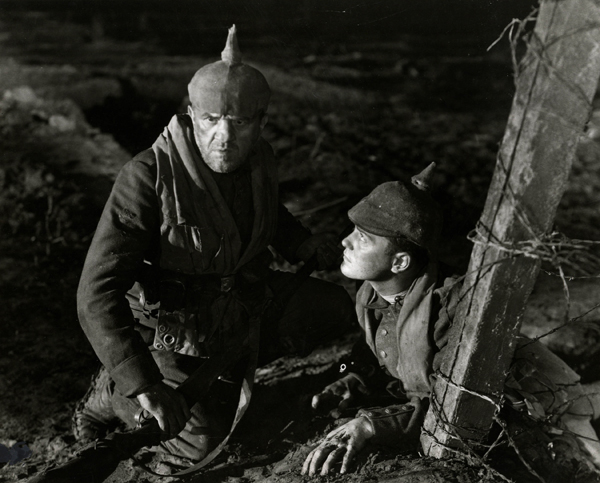Reading in any war book about the food people had to survive on--thin broth with the barest trace of gristle in it, rotting turnips, ditch water, week old bread crusts--arouses in me fantasies of modern day food snobs being subjected to, if not quite this severe a regime, at least wartime era civilian rationing for some extended period of time. The rationed food would not even have to be bad, maybe--just limited in supply, and, most importantly, everybody would have to eat, qualitatively speaking, more or less the same thing. Yes, I am expressing a wormlike desire to see people humbled for at least sensing some aspect of personal superiority in themselves and daring to express it. But I can't endure the archness, pomposity, and judgments upon others' tastes and, by implication, characters and mental capacities, on the subjects of eating and drinking without wanting to see that person driven from whatever level of society he imagines himself to exist on and forced to survive on whatever delicacies he mocked other people for partaking of--forever.
Contrary to what the paragraph above suggests, I have experienced happiness from what I perceived to be superior food and drink in the course of my life, though I am sure I have never felt in doing so the sense of triumph over lesser people or even my former or accustomed lesser self that seems to animate much of the study and experience of heightened eating among the initiated. Most of my happiest memories have had nothing to do with my being superior or in any way more savvy than other people, but were the product of stumbling upon a food culture being so advanced in some area that even the vulgar and socially undeserving could not fail to be exposed to certain delicacies of high quality, because all comparable inferior products had been marginalized or entirely absented from the market--this characterizes things like the beer in the Czech Republic and Germany, bread in France and Italy, coffee and the cafe scene in Austria and elsewhere in the former domains of the Hapsburg empire--you get the idea. The mundaneness, and often fadedness of most of these settings, whose staff and patrons rarely betrayed any consciousness of being inherently above any rivals real or imagined on gustatory grounds, calmed me and put me into the proper mindframe to sense the superior quality of its mundane offerings.
It is clear to me that a major source of the disdain among more cosmopolitan Americans for their less educationally accomplished compatriots is the failure, apart from a few isolated exceptions like the Cajuns in Louisana or maybe some of the more renowned centers of barbeque in the south, of these lower orders to develop, or sustain, a substantial cuisine, especially one in resistance to that pressed upon them by corporate interests. It is hard to overstate the degree of contempt and physical revulsion with which a substantial and socially influential (among the nominally and in some instances certifiedly intelligent) segment of the population has come to regard the ingestion of certain food products, and by extension anyone known or suspected to ingest them on a consistent basis.
I have a rant about the growth of beer snobbery too. First of all, I have drunk a lot of beer in my life. I have had it pretty much every day, and usually a decent amount, for the last twenty-five years. As people know, I lived in the Czech Republic for a couple of years, a country where deciding what beer to drink with breakfast is an important, though not socially deterministic, daily consideration. If one of these little i-phone tapping snots ever tries to tell me to my face to 'get a palate' I may rip the flesh clean off of his skull. Given that beer has traditionally, in the countries where it is most central in the national life, evolved to be consumed in fairly large quantities over a period lasting multiple hours, the most important indicator of quality, and one that correlates strongly with taste, or at least enjoyment of imbibing, because most of my favorite beers do not have a flavor that I identify other than that they taste to me more like beer, that is to say that they give me a perfect sensation of drinking liquid bread and that the pleasure in this will never diminish or grow old, than other varieties do, is in their consistency...
All right, I could go on in that vein for a while, but I will call it a night for (there are some good beer garden scenes and ruminations in AQOTWF by the way...
February 1, 2019--I was really wound up the day I wrote this. I have not gotten this angry for a while. Even at food snobs.
Wednesday, January 28, 2015
Tuesday, January 13, 2015
Author List Volume VII
Arthur Koestler (1905-1983) Darkness at Noon (1941) Born: Sziv Street 16, Budapest, Hungary. Buried: Cremated, location of ashes unknown. College: Vienna Polytechnic.
Edward Noyes Westcott (1846-1898) David Harum (1898) Born: Syracuse, Onodaga, New York. Buried: Oakwood Cemetery, Syracuse, Onondaga, New York.
Nikolai Gogol (1809-1852) Dead Souls (1842), The Overcoat (1842) Born: Gogol Memorial Museum, Velyki Sorochyntsi, Ukraine. Buried: Novodevichy Cemetery, Moscow, Russia. Gogol Museum, 7 Nikitsky Boulevard, Moscow, Russia. Gogol Museum, Sistina Street, Rome, Lazio, Italy.
Brutus (85-42 B.C.) Born: Rome, Lazio, Italy.
Cassius (c. 85-42 B.C.) Born: unknown. Buried: Thasos, East Macedonia & Thrace, Greece. Cassius Roma Restaurant, Orizaba 76, Mexico City, Mexico.
Giovanni Boccaccio (1313-1375) The Decameron (1353-1358). Born: Via Boccaccio, Certaldo, Tuscany, Italy. Buried: Church of Saints Jacopo and Phillippo, Certaldo, Tuscany, Italy.
Madame de Stael (Germaine) (1766-1817) Delphine (1802) Born: 28 Rue Michel-le-Comte, 3eme, Paris, France. Buried: Chateau de Coppet, Coppet, Switzerland.
Napoleon (1769-1821) Born: Casa Buonaparte, Rue St Charles, Ajaccio, Corsica, France. Buried: Les Invalides, 7eme, Paris, France. Napoleon Museum, Monte Carlo, Monaco (Better go soon. It looks like the collection is being sold off next month). College: Ecole Militaire.
Francois Mauriac (1885-1970) Desert of Love (1925) Born: 86 Rue du Pas-St-Georges, Bordeaux, Aquitaine, France. Buried: Cimitiere de Vemars, Vemars, Val d'Oise, Ile-de France, France. Musee Francois Mauriac, Rue Leon Bouchard, Vemars, Val d'Oise, Ile-de-France, France. Centre Francois Mauriac, 17 Route de Malagar, Saint-Maixant, Gironde, France. College: Bordeaux.
George Meredith (1828-1909) The Ordeal of Richard Feverel (1859), The Egoist (1879), Diana of the Crossways (1885) Born: 73 High Street, Portsmouth, Hampshire, England. Buried: Dorking Cemetery, Dorking, Surrey, England.
Caroline Norton (1808-1877) Born: London, England. Buried: Lecropt Church, Lecropt, Stirlingshire, Scotland. Portrait by Heyter, Chatsworth House, Bakewell, Derbyshire, England.
Lord Melbourne (William Lamb) (1779-1848) Born: Melbourne Hall, Church Square, Melbourne, Derbyshire, England. Buried: St Etheldreda Church, Hatfield, Hertfordshire, England. Lord Melbourne Hotel, 63 Melbourne Street, North Adelaide, Australia. College: Trinity (Cambridge).
George Chapple Norton (1800-1875) Born: Kettlethorpe Hall, Wakefield, Yorkshire, England. Buried: Unknown. College: Edinburgh.
Dante Alighieri (1265-1321) The Divine Comedy (1300-21) Born: Casa di Dante, Via S. Margherita 1, Florence, Tuscany, Italy (*****3-3-97*****). Buried: Tomba di Dante, Ravenna, Emilio-Romagna, Italy.
Beatrice Portinari (1266-1290) Born: Palazzo Portinari Salviati, Via del Corso 6, Florence, Tuscany, Italy. Buried: Chiesa di Santa Margherita di Cerchi, Florence, Tuscany, Italy.
Percy Shelley (1792-1822) Born: Field Place, Warnham, Sussex, England. Buried: Protestant Cemetery, Rome, Lazio, Italy (*****3-1-01*****) Heart, Churchyard, St Peter's Church, Bournemouth, Hampshire, England. Keats-Shelley House, 26 Piazza di Spagna, Rome, Lazio, Italy (*****3-1-01*****) College: University (Oxford).
Robert Louis Stevenson (1850-1894) Treasure Island (1883), Dr Jekyll and Mr Hyde (1886), Kidnapped (1886) Born: 8 Howard Place, Edinburgh, Lothian, Scotland. Buried: Mount Vaea, Upolu, Samoa. Robert Louis Stevenson Museum, 1490 Library Lane, St Helena, Napa, California. Robert Louis Stevenson Museum, Vailima, Samoa. Robert Louis Stevenson Memorial Cottage and Museum, 11 Stevenson Lane, Saranac Lake, Essex, New York. Stevenson House Adobe & Garden, 530 Houston Street, Monterey, Monterey, California. Robert Louis Stevenson State Park, Calistoga, Napa, California. Statue, Colinton Parish Church, Dell Road, Colinton, Edinburgh, Lothian, Scotland. Edinburgh Writers' Museum, Lady Stair's Close, Edinburgh, Lothian, Scotland. College: Edinburgh.
Henrik Ibsen (1828-1906) A Doll's House (1879), Ghosts (1881), Hedda Gabler (1890) Born: Henrik Ibsen Museum, Venstophogda 74, Skien, Norway. (*****6-28-00*****) Buried: Var Freslurs Gravlund, Oslo, Norway. (*****6-26-00*****) Ibsenmuseet, Henrik Ibsens Gate 26, Oslo, Norway. (*****6-26-00*****) Ibsen-Museet, Grimstad, Norway (*****6-30-00*****).
Erechtheion, Athens, Attica, Greece.
Miguel de Cervantes Saavedra (1547-1616) Don Quixote (1605, 1615) Born: Casa Natale de Cervantes, C/Mayor 48, Alcala de Henares, Madrid aut. com., Spain. Buried: Convento de los Trinitarios, Madrid, Spain. Hostal Miguel de Cervantes, Calle la Imogen 12, Alcala de Henares, Madrid aut. com., Spain. Museo Casa de Cervantes. Calle Rastro, Valladolid, Castile and Leon, Spain. Statue, Plaza de Espana, Madrid, Spain. Instituto Miguel de Cervantes, Guanajuato, Mexico.
Peter Anthony Motteux (1663-1718) Born: Rouen, Upper Normandy, France. Buried: St Andrew Undershaft Churchyard, City, London, England.
James M. Cain (1892-1977) Double Indemnity (1943) Born: Paca-Carroll House, St John's College, Annapolis, Maryland. Buried: Body donated to medical science. College: Washington (Maryland).
Bram Stoker (1847-1912) Dracula (1897) Born: 15 Marino Crescent, Clontarf, Dublin, Ireland. Buried: Golders Green Crematorium, Golders Green, London, England. Castle Dracula, Clontarf, Dublin, Ireland. Bram Stoker Dracula Experience, 9 Marine Parade, Whitby, Yorkshire, England. College: Trinity (Dublin).
Henry Adams (1838-1918) The Education of Henry Adams (1907) Born: Mt Vernon Place, Boston, Suffolk, Massachusetts. Buried: Rock Creek Cemetery, Washington, D.C. Harvard Yard, Cambridge, Middlesex, Massachusetts. Mont-St-Michel, Lower Normandy, France. Chartres Cathedral, Chartres, Centre, France. College: Harvard.
Charles Francis Adams (1807-1886) Born: SE Corner Boylston & Tremont Streets, Boston, Suffolk, Massachusetts. Buried: Mt Wollaston Cemetery, Quincy, Norfolk, Massachusetts. College: Harvard
Edward Noyes Westcott (1846-1898) David Harum (1898) Born: Syracuse, Onodaga, New York. Buried: Oakwood Cemetery, Syracuse, Onondaga, New York.
Nikolai Gogol (1809-1852) Dead Souls (1842), The Overcoat (1842) Born: Gogol Memorial Museum, Velyki Sorochyntsi, Ukraine. Buried: Novodevichy Cemetery, Moscow, Russia. Gogol Museum, 7 Nikitsky Boulevard, Moscow, Russia. Gogol Museum, Sistina Street, Rome, Lazio, Italy.
Brutus (85-42 B.C.) Born: Rome, Lazio, Italy.
Cassius (c. 85-42 B.C.) Born: unknown. Buried: Thasos, East Macedonia & Thrace, Greece. Cassius Roma Restaurant, Orizaba 76, Mexico City, Mexico.
Giovanni Boccaccio (1313-1375) The Decameron (1353-1358). Born: Via Boccaccio, Certaldo, Tuscany, Italy. Buried: Church of Saints Jacopo and Phillippo, Certaldo, Tuscany, Italy.
Madame de Stael (Germaine) (1766-1817) Delphine (1802) Born: 28 Rue Michel-le-Comte, 3eme, Paris, France. Buried: Chateau de Coppet, Coppet, Switzerland.
Napoleon (1769-1821) Born: Casa Buonaparte, Rue St Charles, Ajaccio, Corsica, France. Buried: Les Invalides, 7eme, Paris, France. Napoleon Museum, Monte Carlo, Monaco (Better go soon. It looks like the collection is being sold off next month). College: Ecole Militaire.
Francois Mauriac (1885-1970) Desert of Love (1925) Born: 86 Rue du Pas-St-Georges, Bordeaux, Aquitaine, France. Buried: Cimitiere de Vemars, Vemars, Val d'Oise, Ile-de France, France. Musee Francois Mauriac, Rue Leon Bouchard, Vemars, Val d'Oise, Ile-de-France, France. Centre Francois Mauriac, 17 Route de Malagar, Saint-Maixant, Gironde, France. College: Bordeaux.
George Meredith (1828-1909) The Ordeal of Richard Feverel (1859), The Egoist (1879), Diana of the Crossways (1885) Born: 73 High Street, Portsmouth, Hampshire, England. Buried: Dorking Cemetery, Dorking, Surrey, England.
Caroline Norton (1808-1877) Born: London, England. Buried: Lecropt Church, Lecropt, Stirlingshire, Scotland. Portrait by Heyter, Chatsworth House, Bakewell, Derbyshire, England.
Lord Melbourne (William Lamb) (1779-1848) Born: Melbourne Hall, Church Square, Melbourne, Derbyshire, England. Buried: St Etheldreda Church, Hatfield, Hertfordshire, England. Lord Melbourne Hotel, 63 Melbourne Street, North Adelaide, Australia. College: Trinity (Cambridge).
George Chapple Norton (1800-1875) Born: Kettlethorpe Hall, Wakefield, Yorkshire, England. Buried: Unknown. College: Edinburgh.
Dante Alighieri (1265-1321) The Divine Comedy (1300-21) Born: Casa di Dante, Via S. Margherita 1, Florence, Tuscany, Italy (*****3-3-97*****). Buried: Tomba di Dante, Ravenna, Emilio-Romagna, Italy.
Beatrice Portinari (1266-1290) Born: Palazzo Portinari Salviati, Via del Corso 6, Florence, Tuscany, Italy. Buried: Chiesa di Santa Margherita di Cerchi, Florence, Tuscany, Italy.
Percy Shelley (1792-1822) Born: Field Place, Warnham, Sussex, England. Buried: Protestant Cemetery, Rome, Lazio, Italy (*****3-1-01*****) Heart, Churchyard, St Peter's Church, Bournemouth, Hampshire, England. Keats-Shelley House, 26 Piazza di Spagna, Rome, Lazio, Italy (*****3-1-01*****) College: University (Oxford).
Robert Louis Stevenson (1850-1894) Treasure Island (1883), Dr Jekyll and Mr Hyde (1886), Kidnapped (1886) Born: 8 Howard Place, Edinburgh, Lothian, Scotland. Buried: Mount Vaea, Upolu, Samoa. Robert Louis Stevenson Museum, 1490 Library Lane, St Helena, Napa, California. Robert Louis Stevenson Museum, Vailima, Samoa. Robert Louis Stevenson Memorial Cottage and Museum, 11 Stevenson Lane, Saranac Lake, Essex, New York. Stevenson House Adobe & Garden, 530 Houston Street, Monterey, Monterey, California. Robert Louis Stevenson State Park, Calistoga, Napa, California. Statue, Colinton Parish Church, Dell Road, Colinton, Edinburgh, Lothian, Scotland. Edinburgh Writers' Museum, Lady Stair's Close, Edinburgh, Lothian, Scotland. College: Edinburgh.
Henrik Ibsen (1828-1906) A Doll's House (1879), Ghosts (1881), Hedda Gabler (1890) Born: Henrik Ibsen Museum, Venstophogda 74, Skien, Norway. (*****6-28-00*****) Buried: Var Freslurs Gravlund, Oslo, Norway. (*****6-26-00*****) Ibsenmuseet, Henrik Ibsens Gate 26, Oslo, Norway. (*****6-26-00*****) Ibsen-Museet, Grimstad, Norway (*****6-30-00*****).
Erechtheion, Athens, Attica, Greece.
Miguel de Cervantes Saavedra (1547-1616) Don Quixote (1605, 1615) Born: Casa Natale de Cervantes, C/Mayor 48, Alcala de Henares, Madrid aut. com., Spain. Buried: Convento de los Trinitarios, Madrid, Spain. Hostal Miguel de Cervantes, Calle la Imogen 12, Alcala de Henares, Madrid aut. com., Spain. Museo Casa de Cervantes. Calle Rastro, Valladolid, Castile and Leon, Spain. Statue, Plaza de Espana, Madrid, Spain. Instituto Miguel de Cervantes, Guanajuato, Mexico.
Peter Anthony Motteux (1663-1718) Born: Rouen, Upper Normandy, France. Buried: St Andrew Undershaft Churchyard, City, London, England.
James M. Cain (1892-1977) Double Indemnity (1943) Born: Paca-Carroll House, St John's College, Annapolis, Maryland. Buried: Body donated to medical science. College: Washington (Maryland).
Bram Stoker (1847-1912) Dracula (1897) Born: 15 Marino Crescent, Clontarf, Dublin, Ireland. Buried: Golders Green Crematorium, Golders Green, London, England. Castle Dracula, Clontarf, Dublin, Ireland. Bram Stoker Dracula Experience, 9 Marine Parade, Whitby, Yorkshire, England. College: Trinity (Dublin).
Henry Adams (1838-1918) The Education of Henry Adams (1907) Born: Mt Vernon Place, Boston, Suffolk, Massachusetts. Buried: Rock Creek Cemetery, Washington, D.C. Harvard Yard, Cambridge, Middlesex, Massachusetts. Mont-St-Michel, Lower Normandy, France. Chartres Cathedral, Chartres, Centre, France. College: Harvard.
Charles Francis Adams (1807-1886) Born: SE Corner Boylston & Tremont Streets, Boston, Suffolk, Massachusetts. Buried: Mt Wollaston Cemetery, Quincy, Norfolk, Massachusetts. College: Harvard
Monday, January 12, 2015
Erich Maria Remarque--All Quiet on the Western Front (1929)
One would think that there must have been many efforts made at writing books taking up the same general theme as this one in the years following the first world war. But out of all of those efforts, this is one of the handful that made the greatest impact on the popular imagination of the Western nations in its time, and has come down to our own day, as far as I can make out, as the novel most closely associated with the 'experience', as it were, of that watershed catastrophe of modern history, particularly with regard to the trench warfare of the western front. I had never read it until now, though I had always been interested in doing so, and I was not disappointed. While there is some nitpicking on literary grounds that could be made, it is a good book, moving, it has a soul to it. It is to my mind short (299 pages of standard print--under 180 or so I barely consider to be a novel), and is written in the to me agreeable modern style that arose between the wars, which was unexpected, even though the IWE introduction itself noted that it had 'the clipped sentences, brief paragraphs, and unadorned descriptive language that have proved so effective in the novels of James M. Cain(!).' This makes the book a rather quick read; I actually would not have minded a little more incident and character development, though I appreciate that it is really difficult to produce a book that is successful and resonant to any degree, and that the tone and briefly recounted characters and incidents--which does give them, probably intentionally, a rather ghostly effect in the reader's imagination--are what makes this particular story work.
I did not read this in high school, but I think in the past it was often read in high school, and it does seem like it would still be a good book for the earlier high school years, 9th or 10th grade, for particular kinds of students anyway, who, however, make up an ever-dwindling percentage of the school-age population and whom the education authorities are ever obsessed about not being perceived to favor in the organization of school curriculums (curricula?). But I think in certain instances it could be a valuable part of a literary education.
Fifteen or twenty years ago when I was recently out of school and more of a closer reader than I am now, I don't know that I would have thought as much of this book, or been as moved by it as I am again now (I probably would have felt a fondness for it in high school). This even though its literary flaws, with which one would think I of all people would have been sympathetic, are primarily the result of a young man (Remarque was 32 when the book was published) who has lived through an apocalypse and is unloading his memories of that experience with at times a mild excess of emotion and rage that is not focused with perfect precision. It is probably not full of deep intellectual insights--I doubt the Straussians would have much interest in it--but the emotional despair of this shattered generation has always resonated with me, and this was as affecting as anything else I have read about this war in that regard.
I will only include one quote, which I think conveys the spirit of the book pretty well. It is during the part when the narrator, Baumer, is home on leave and has to pay a visit to the mother of one of his old schoolmates and fellow soldiers who has died. Predictably, the mother carries on hysterically, to the irritation of Baumer:
"I console her, but she strikes me as rather stupid all the same. Why doesn't she stop worrying? Kemmerich will stay dead whether she knows about it or not. When a man has seen so many dead he cannot understand any longer why there should be so much anguish over a single individual."
The descriptions of death, and especially of corpses, in this are more than usually striking. Shell blasts and shrapnel blew bodies (and frequently the clothes on them) apart, so that the naked lower half of a man could be seen dangling from a tree while his dismembered arms and torso were strewn elsewhere on the battlefield. Even this did not seem as horrible to me as the picture given of the victims of gassing, who sat upright in their holes, their faces turned blue. The poison gas used in World War I seems to be the one development in modern warfare that even military people found to be so universally horrifying that concerted efforts have been made to curtail its use in ensuing conflicts, my impression is successfully. Even reading about it one is instinctively repulsed by the idea of it more than all the other awful things going on, none of which I am going to pretend I would have been equal to standing up to at any age, let alone as an eighteen or nineteen year old. The only reasons I can come with for this repulsion are absurd, but I think part of it is the sense that poison is not really fair, that it is not even a test of military prowess. Also it seems to eviscerate the body from the inside out, especially the lungs, the pain of which seems to be more disturbing to contemplate than suffering even fatal battle-wounds.
The edition of the book I have. I got it for free in an incredible haul a few years ago when one of the local high school libraries had a massive book purge of books high school students have no interest in anymore, presumably to make more room for more multimedia/computer space.
The other reading list that I have been working through for the last twenty years, taken from the GRE literature test prep book, is overwhelmingly concentrated, to a surprising extent to my mind, on English language works, with continental European works very sparsely represented. This is one of the main reasons I came back to the IWE list, as it does have more of a presence of the non-English European literatures, especially novels, though this has not shown up in my reports thus far, the "As" being more heavily weighted towards English and American books than most of the rest of the letters. I have hardly read anything from the German countries especially since I was in school, and I wanted to correct that. I don't know that All Quiet on the Western Front is considered to be a great example of German literature, but some of the scenes at least, especially those that are away from the front or even reminiscences on the world away from the front, give one something of an atmosphere that is different from the standard scenes of the English and American literary worlds, that gives a flavor of the landscape and tone of life in Germany and old Europe generally that makes for some enjoyment in the reading, even though these are not described for the most part with a nostalgic aspect, and of course the abomination of the war is exposing the emptiness of much of the rituals of society and traditional life and rendering them obsolete. Still, for those of us who live such mental life as we have through the templates given us by the classic literature and art of the past, what else do we have?
In a strange coincidence, this is the second author in a row in this record with a personal connection to one of Charlie Chaplin's wives. Remarque was married to the at one time extremely gorgeous movie actress Paulette Goddard, who had previously been married to Chaplin (and Burgess Meredith as well) from 1958 until his death in 1970. Remarque, all of whose books sold well, though other than All Quiet none of them seem to be well remembered today, had evidently amassed quite a lot of wealth, as well as a serious art collection, by the time of this marriage, much of which his widow (who was his second wife) inherited upon his death, in addition to her own evidently already substantial wealth.
The Challenge
1. Jon Krakauer--Into Thin Air..........................................................2,266
2. Dennis McNally--A Long, Strange Trip..............................................65
3. New Webster's American Handy College Dictionary (4th Edition)...52
4. Vittorio Arrigoni--Gaza Stay Human....................................................8
5. Paul Dowswell--Eleven Eleven.............................................................1
Michael Marshall--Gallant Creoles.......................................................1
The extensive Zero list for this challenge includes War Classics: The Remarkable Life of Scottish Scholar Christina Keith on the Western Front, R.E. Foster, Wellington & Waterloo, Mike Brooke, Follow Me Through, Schmoop Literature's Guide to All Quiet on the Western Front, and Gaston Maspero's History of Egypt, Volume I. Maspero, a Frenchman, was actually an Egypt scholar of some renown. There are twelve volumes in the History all told, but like the Cambridge History of English Literature, the different volumes are often sold separately and it seems can be profitably read as stand alone books. I was considering taking it up if I could have procured a copy easily. I have actually read the Krakauer book before. It had some interest for me in a journalistic, zeitgeisty kind of way, but it is not something anyone needs to read twice.
Remarque
The movie challenge produced a pair of old classics, including the most famous one based on this post's book. I have seen both of these landmark films recently enough that I will probably pass on them for now:
1. On the Waterfront...................................315
2. All Quiet on the Western Front (1930)...229
I am curious to see All Quiet again and see how it compares with the book, though the film, and maybe the book too, are unusual in that they are more about the war as a whole than in the specific incidents and characters that it is made up of.
Subscribe to:
Posts (Atom)




.jpg)




